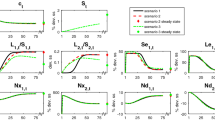Abstract
Does trade impoverish unskilled workers in Western industrial countries? This is an emotive way of framing a question which has received a great deal of attention from economists in recent years: to what extent has trade with labour-abundant low-wage economies affected Western labour markets? Currently, it is imports from Asia which dominate discussions, although these issues are equally pertinent for trade with Eastern Europe, the countries of the CIS (Former Soviet Union), and Latin America. We are not the only ones to try and catch the eye in this way, Freeman (1995) rather provocatively asks: ‘are your wages being set in Beijing?’
Access this chapter
Tax calculation will be finalised at checkout
Purchases are for personal use only
Preview
Unable to display preview. Download preview PDF.
Similar content being viewed by others
References
Baldwin, R. (1994) ‘The effects of trade and foreign direct investment on employment and relative wages’, OECD Economic Studies, 23, 7–54.
Bernard, A. and Jensen, J. (1997) ‘Exporters, skill upgrading, and the wage gap’, Journal of International Economics, 42, 3–31.
Bhagwati, J. (1997) ‘Trade and wages: a malign relationship’, in Kuyvenhoven, A., Memedovic, O. and Molle, W. (eds), Globalization of Labour Markets, Kluwer, 31–65.
Borjas, G., Freeman, R. and Katz, L. (1992) ‘On the labour market effects of immigration and trade’, in Borjas, G. and Freeman, R. (eds), Immigration and The Work Force, Cambridge, MA: NBER, 213–44.
Brainard, S.L. and Riker, D. (1997) Are US multinationals exporting US Jobs?’, Working Paper, 5958, NBER.
CEC (1993) ‘Growth, competitiveness and employment’, Bulletin of the European Communities, Supplement 6/93.
Cortes, O., Jean, S. and Pisani-Ferry, J. (1996) ‘Trade with emerging countries and the labour market: the trench case’, Working Document, 96–04, CEPII.
Deardorff, A.V. and Hakura, D.S. (1994) ‘Trade and Wages — What are the Questions?’, in Bhagwati, J. and Kosters, M.H. (eds), Trade and Wages. Levelling wages Down?, Washington, DC: AEI Press, 76–107.
Deardorff, A. and Staiger, R. (1988) ‘An interpretation of the factor content of trade’, Journal of International Economics, 24, 97–107.
Feenstra, R. and Hanson G. (1996) ‘Globalization, outsourcing, and wage inequality’, Working Paper, 5424, NBER.
Freeman, R. (1995) ‘Are your wages set in Beijing?’, Journal of Economic Perspectives, 9, 15–23.
Hanson, G. and Harrison, A. (1995) ‘Trade, technology and wage inequality’, Working Paper, 5110, NBER.
Herpman, E. and Krugman, P.R. (1985) Market Structure and Foreign Trade, Cambridge, MA: MIT Press.
Krugman, P. (1995) ‘Technology, trade and factor prices’, Working Paper, 5355, NBER.
Krugman, P. and Lawrence, R. (1993) ‘Trade, jobs and wages’, Working Paper, 4478, NBER.
Lawrence, R. (1994) ‘Trade, multinationals, and labour’, Working Paper, 4836, NBER.
Lawrence, R. and Slaughter, M. (1993) ‘International trade and American wages in the 1980s: giant sucking sound or small hiccup’, Brookings Papers on Economic Activity: Microeconomics, 2, 161–226.
Learner, E. (1994) ‘Trade, wages and revolving door ideas’, Working Paper, 4716, NBER.
Learner, E. (1996) ‘In search of Stolper—Samuelson Effects on US Wages’, Working Paper, 5427, NBER.
Markusen, J. and Venables, A. (1996) ‘Multinational production, skilled labour, and real wages’, Working Paper, 5483, NBER.
Messerlin, P.A. (1995) ‘The impact of trade and capital movements on labour: evidence on the French case’, OECD Economic Studies, 24, 89–124.
OECD (1992) Structural Change and Industrial Performance: A Seven-country Growth Decomposition Study, Paris: OECD.
Oliveira-Martins, J. (1994) ‘Market structure, trade and industry wages’, OECD Economic Studies, 22, 1–23.
Richardson, J.D. (1995) ‘Income inequality and trade: how to think, what to conclude’, Journal of Economic Perspectives, 9, 33–55.
Sachs, J. and Shatz, H. (1994) ‘Trade and jobs in US manufacturing’, Brookings Papers on Economic Activity, 1, 1–84.
Wood, A. (1994) North-South Trade, Employment and Inequality, Oxford: Clarendon Press.
Wood, A. (1995) ‘How trade hurt unskilled workers’, Journal of Economic Perspectives, 9, 57–80.
Wood, A. (1997) ‘Comment of Bhagwati’, in Kuyvenhoven, A., Memedovic, O. and Molle, W. (eds), Globalization of Labour Markets, Dordrecht: Kluwer, 71–74.
Editor information
Editors and Affiliations
Copyright information
© 1999 Paul Brenton
About this chapter
Cite this chapter
Brenton, P. (1999). Rising Trade and Falling Wages: A Review of the Theory and the Empirics. In: Brenton, P., Pelkmans, J. (eds) Global Trade and European Workers. Palgrave Macmillan, London. https://doi.org/10.1007/978-1-349-27035-4_2
Download citation
DOI: https://doi.org/10.1007/978-1-349-27035-4_2
Publisher Name: Palgrave Macmillan, London
Print ISBN: 978-1-349-27037-8
Online ISBN: 978-1-349-27035-4
eBook Packages: Palgrave Economics & Finance CollectionEconomics and Finance (R0)




